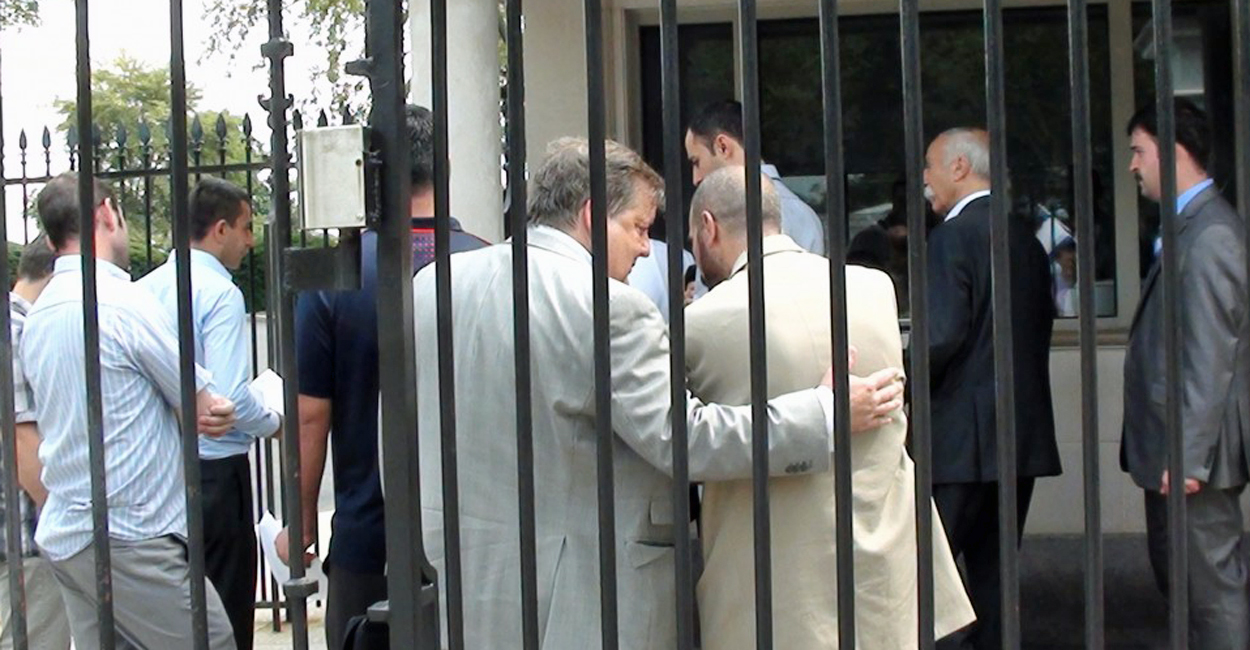As ISIS Tells Yezidis to ‘Convert to Islam or Die,’ One Man Pleads for Help at White House
Josh Siegel /
In January, Mirza Ismail married his wife, Nofa Kamal, in Sinjar, Iraq, near the mountainous region where today thousands of Yezidi Iraqis are stranded.
After three months in Sinjar, Ismail, the chairman of the Yezidi Human Rights Organization, left for his home in Brampton, Canada, before Islamic militants escalated their campaign to wipe out non-Muslims.
Kamal stayed in Iraq, hoping to eventually obtain immigration status that would allow her to leave.
Now, she is one of some 40,000 Yezidis, a religious minority group, stranded on Mount Sinjar after fleeing militants from the Islamic State of Iraq and Syria, who threaten them with two choices.
“They either convert to Islam or die,” Ismail told The Daily Signal, standing this afternoon in a suit and tie in front of a gate guarding the White House.
This week, Ismail traveled from Brampton to Washington, D.C., to ask for U.S. action to save his dwindling Yezidi population from the persecution of ISIS.
On Thursday night, after Ismail said he and others in his organization met with officials from the U.S. Agency for International Development, President Obama announced he had authorized airstrikes, if necessary, to break the siege of Mount Sinjar.
Obama also assigned military aircraft to drop supplies to Mount Sinjar—5,300 gallons of drinking water and 8,000 meals to eat.
Ismail welcomes the American action, but on Friday he again met with administration officials, including Ben Rhodes, Obama’s deputy national security adviser for strategic communication, to discuss the weakened state of the Yezidi people.
‘We Want to Live in Peace’
Ismail did not appear nervous or fearful late Friday afternoon, moments before he was among a small group to be escorted into the White House.
His hand shake was firm and long. He smiled often.
“God bless America for helping us,” Ismail said. “They did a great thing. We didn’t expect it [action] right away. But food is a temporary solution. We want to live in peace.”
Some 40 children have already died on Mount Sinjar from heat and dehydration, according to UNICEF.
Ismail doesn’t know if his wife is among the dead.
Because her cell phone’s battery likely died, it’s been two days since Ismail spoke with his wife.
“God bless America for helping us,” says Mirza Ismail of Yezidi Iraqis.
His parents, four brothers and six sisters are also stuck on Mount Sinjar, and he hasn’t communicated with them either.
“I am alone,” Ismail said. “On Aug. 2 at midnight, ISIS attacked them [his family]. The Kurdish peshmerga [Iraq’s strongest military force] did not fight. I worry if they will survive. It’s very hot in the summer there. If you put water outside, in a few hours it would make tea.”
Ismail fled Sinar, Iraq, in 1991—first to Turkey, then Canada—after years of persecution by Muslims.
His wife and family remain in Iraq.
ISIS views Yezidis as apostates and they say they want to get rid of the group.
ISIS issued an ultimatum to tens of thousands of Yezidis on Saturday to convert to Islam, pay a religious fine, flee their homes or face death.
Faced with the threats, the Yezidis, half of them children, fled to the nearby mountains, where they were running out of food and water.
“My family had nothing but the clothes on their back,” Ismail said.

Mirza Ismail was escorted into the White House to talk about the status of Yezidis in Iraq. (Photo: Kelsey Harkness/The Daily Signal)
Who Are the Yezidis?
The Yezidi or Yazidi—the two terms are used interchangeably—live mostly in northern Iraq, in north-central Nineveh province and northeastern Iraqi Kurdistan.
They’ve been in the region for about a thousand years.
There are about 600,000 Yazidis worldwide, including about 400 or so families in the United States—mostly in Lincoln, Neb.—and 150 families in Canada, Ismail says.
The group has been described as a sect due to its secretive nature.
Yezidis are widely considered to be misunderstood.
They have unique beliefs and customs, such as refusing to eat lettuce because a group of their people were slaughtered in lettuce fields in the 18th and 19th centuries.
Their belief system is thought to be a mix of different religions, including Christianity, Islam and Zoroastrianism, a Persian religion that was once the state religion in parts of ancient empires in what is now Iran.
But it is their gentle nature, Ismail says, that makes ISIS’ brutality striking.
“It [Yezidism] is very, very close to Christianity,” Ismail said. “It is based on peace. We are peaceful people. We respect everybody. We are not allowed to kill someone unless they come to your house to kill you. We never asked for any of this. It’s very hard when you are a peaceful person and don’t want to hurt anyone.”
To save his people—and his family—Ismail hopes international forces, whether it be the United States or the United Nations, put feet to the ground on Mount Sinjar and escort the Yezidis to their villages.
Obama’s national security officials did not promise Ismail that his wish would be granted, but Rhodes voiced support on Twitter:
I was deeply moved by my meeting with the Yezidi community at the White House. The US stands with the Yezidi people in this tragic time
— Ben Rhodes (@rhodes44) August 9, 2014
As Ismail awaited a flight back to Canada, he could only hope from so far away.
“We don’t understand their [ISIS] mentality,” Ismail said. “They don’t care about killing. But I am hopeful.”
